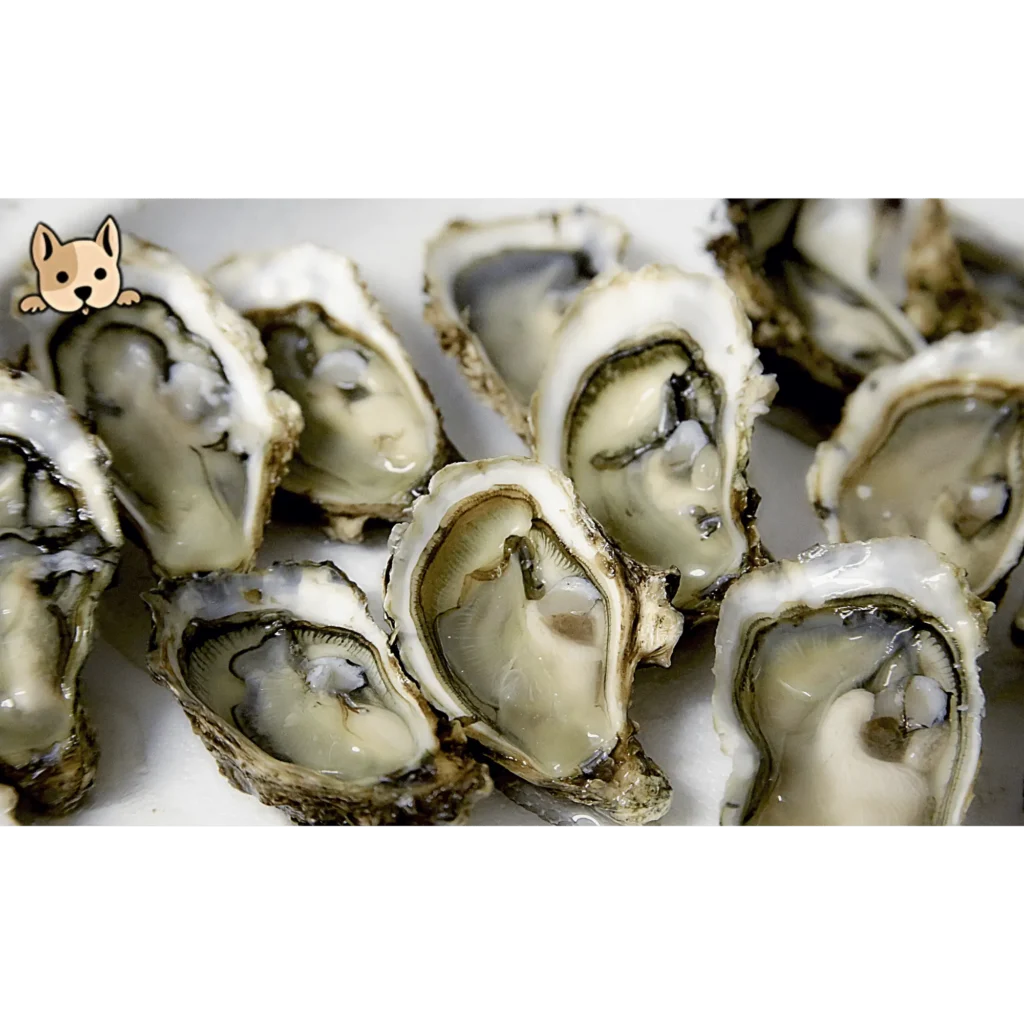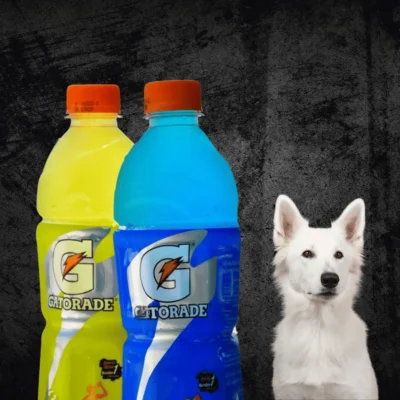Oysters, with their tantalizing taste and reputation as a seafood delicacy, often pique the curiosity of dog owners wondering if they can share this treat with their beloved pets. While dogs are known for their diverse appetites, not all human foods are safe for them to consume. In the case of oysters, considerations of both safety and nutritional value come into play.
In this article, we’ll delve into the question: Can dogs eat oysters? We’ll explore the potential risks and benefits of feeding oysters to your pup and provide essential tips on how to safely incorporate this seafood into your dog’s diet.
Here are the topics we’ll be covering in this blog post:
- What are Oysters?
- Can Dogs Eat Oysters?
- Health Benefits of Oysters for Dogs
- Potential Drawbacks of Oysters for Dogs
- How to Safely Serve Oysters to Dogs?
- How Many Oysters Are Safe for Your Dog?
What are Oysters?

Oysters, intriguing and delicious creatures of the oceans, belong to the Ostreidae family and are scientifically known as bivalves. With their hard shells protecting their soft, slimy bodies, they have been enjoyed as a delicacy for centuries.
Oysters, found in both freshwater and saltwater environments, play a crucial role in maintaining marine ecosystems by filtering out pollutants. As filter feeders, they consume tiny particles like plankton for their nutrition.
Humans have been eating oysters since ancient times! The Romans and Greeks loved them and even transported them long distances during Caesar’s reign. This historical connection makes oysters even more fascinating.
Can Dogs Eat Oysters?
Yes, you can give oysters, also known as lobster, to your dog. They’re packed with protein and can be really good for them. It can be a tasty and healthy treat for your dog, but there are a few things to keep in mind. Always serve cooked oysters to avoid any potential health issues from raw ones.
You can steam fresh oysters or use canned ones. Avoid fried or smoked oysters, as they may not be suitable for your dog’s digestion. Also, remember to remove the shells before serving to prevent choking hazards. By following these tips, you can safely give your dog some oysters as an occasional treat!
Health Benefits of Oysters for Dogs:

Oysters can offer some health perks for dogs when given in moderation and properly prepared:
1. Nutrient-Rich:
Oysters are packed with essential nutrients such as protein, omega-3 fatty acids, vitamins (including vitamin A, vitamin B12, and vitamin D), and minerals (such as zinc, iron, and selenium).
These nutrients are vital for your dog’s overall health, including maintaining a healthy coat, supporting immune function, and promoting proper growth and development.
2. Omega-3 Fatty Acids:
Oysters are a good source of omega-3 fatty acids, particularly EPA (eicosapentaenoic acid) and DHA (docosahexaenoic acid).
These fatty acids have anti-inflammatory properties and are beneficial for promoting healthy skin and coat, reducing inflammation, and supporting cognitive function in dogs.
3. Boosts Immune System:
The vitamins and minerals found in oysters, such as vitamin D, zinc, and selenium, play important roles in supporting a strong immune system in dogs.
Adequate levels of these nutrients can help your dog fight off infections and illnesses more effectively.
4. Supports Joint Health:
The omega-3 fatty acids present in oysters have been shown to have anti-inflammatory effects, which can help alleviate symptoms of arthritis and other joint-related issues in dogs.
Including oysters in your dog’s diet may contribute to better joint health and mobility, especially in senior dogs or those prone to joint problems.
5. Promotes Dental Health:
Chewing on oysters can help promote dental health in dogs by aiding in the removal of plaque and tartar buildup on their teeth.
However, it’s important to ensure that the oysters are served at a safe size and texture to prevent choking hazards.
6. Antioxidant:
Oysters indeed contain antioxidants, including 3,5-Dihydroxy-4-methoxybenzyl alcohol (DHMBA), which is relatively rare in other foods. Antioxidants play a crucial role in neutralizing harmful molecules called free radicals, which can damage cells and contribute to various diseases and aging processes.
Lobsters are rich in vitamin B12, which also possesses antioxidant properties. Vitamin B12 helps support various cellular processes and is involved in the production of red blood cells and DNA synthesis. Its antioxidant properties contribute to overall health and may help reduce oxidative damage in the body.
Despite these potential benefits, it’s crucial to remember that not all dogs may tolerate oysters well, and some may have allergies or sensitivities to shellfish. Always introduce new foods gradually and in moderation, and consult with your veterinarian before making any significant changes to your dog’s diet.
Potential Drawbacks of Oysters for Dogs:

While oysters can offer health benefits to dogs when given in moderation and properly prepared, there are also risks to consider:
1. Choking Hazard:
Oysters can pose a choking hazard, especially if they’re served whole or in large pieces. Dogs may not chew their food thoroughly before swallowing, increasing the risk of choking, especially in smaller breeds or dogs with dental issues.
It’s essential to prepare oysters in size and texture that are safe for your dog to consume.
2. Foodborne Illness:
Raw or undercooked oysters can contain harmful bacteria, viruses, or parasites such as Salmonella, Vibrio, or Norovirus, which can cause foodborne illnesses in dogs.
Cooking oysters thoroughly can help reduce this risk, but it’s still essential to handle and prepare seafood safely to prevent contamination.
3. Shellfish Allergies:
Some dogs may be allergic to shellfish, including oysters. Allergic reactions can range from mild symptoms like itching and digestive upset to more severe reactions such as difficulty breathing or anaphylaxis.
If your dog has a known allergy to shellfish or seafood, it’s best to avoid feeding them oysters altogether.
4. High Sodium Content:
Oysters naturally contain sodium, and commercially available oysters may be preserved in brine or saltwater, increasing their sodium content. Excessive sodium intake can lead to dehydration, electrolyte imbalances, and other health issues, particularly in dogs with kidney or heart problems.
It’s important to limit the amount of salt in your dog’s diet and choose fresh or low-sodium options when feeding them oysters.
5. Mercury Contamination:
Like other seafood, oysters may contain trace amounts of mercury, which can accumulate in your dog’s body over time and potentially lead to mercury toxicity, especially with frequent or high consumption.
While oysters typically have lower mercury levels compared to larger fish species, it’s still important to consider overall mercury exposure from your dog’s diet, especially if they consume seafood regularly.
6. Digestive Upset:
Introducing new foods, including oysters, into your dog’s diet can sometimes cause digestive upset, such as diarrhea, vomiting, or gas, particularly if they have a sensitive stomach or underlying gastrointestinal issues. It’s essential to monitor your dog for any adverse reactions after feeding them oysters and adjust their diet accordingly.
Overall, while oysters can be a nutritious addition to some dogs’ diets, it’s crucial to consider potential risks and drawbacks and consult with your veterinarian before incorporating them into your dog’s regular meals. Your vet can provide personalized guidance based on your dog’s individual health needs and dietary requirements.
How to Safely Serve Oysters to Dogs?
Feeding oysters to dogs can be done safely if done in moderation and with careful preparation. Here’s a guide on how to safely serve oysters to dogs:
1. Cook the oysters:
Raw oysters can carry bacteria and parasites that may be harmful to dogs. Therefore, it’s crucial to cook the oysters thoroughly before serving them to your dog. Boiling or steaming the oysters until fully cooked is the safest method.
2. Remove the shells:
Make sure to remove the shells from the cooked oysters before serving them to your dog. Oyster shells can be sharp and may pose a choking hazard or cause injury to your dog’s digestive tract if ingested.
3. Serve in moderation:
While oysters can provide valuable nutrients like protein, omega-3 fatty acids, and vitamins, they should be fed to dogs in moderation. Too much of any new food can upset a dog’s stomach or cause digestive issues.
4. Monitor for allergies:
Like with any new food, it’s essential to monitor your dog for any signs of allergic reactions after feeding them oysters for the first time. Symptoms of allergies in dogs may include itching, vomiting, diarrhea, or difficulty breathing. If you notice any adverse reactions, discontinue feeding oysters and consult your veterinarian.
5. Consider individual dietary needs:
Not all dogs will tolerate oysters well. Some dogs may have sensitivities or underlying health conditions that make oysters unsuitable for them. Always consider your dog’s individual dietary needs and consult with your veterinarian before introducing any new food to their diet.
6. Avoid additives:
When preparing oysters for your dog, avoid adding any seasonings, sauces, or additional ingredients that may be harmful to dogs, such as onions, garlic, or excess salt.
7. Feed responsibly:
Oysters should be treated as an occasional treat rather than a staple in your dog’s diet. They can be offered as a special treat on occasion, but they should not replace balanced dog food.
By following these guidelines, you can safely introduce oysters into your dog’s diet as an occasional treat, providing them with added nutrients without compromising their health.
How Many Oysters Are Safe for Your Dog?
Feeding your furry friend the right amount of food is crucial for their health and well-being. Here’s a handy table with feeding guidelines and portion control tips:
| Pet Size | Daily Food (in cups) | Frequency of Meals |
| Small | 1/4 – 1/2 | 3-4 |
| Medium | 1/2 – 1 | 2-3 |
| Large | 1 – 2 | 2 |
These guidelines are based on pet size, providing recommended daily food intake in cups and the frequency of meals per day. Remember, these amounts can vary depending on factors like age, activity level, and overall health. If your pet has specific dietary needs, consulting a vet is a wise decision.
Fun Fact:
Did you know? Dogs have an extraordinary sense of smell, estimated to be tens of thousands to even 100,000 times more sensitive than ours!
Final Thought:
In conclusion, while dogs can enjoy oysters as a tasty and nutritious treat, it’s essential to approach their inclusion in your pet’s diet with caution. By following the guidelines outlined in this article, you can safely give oysters to your pup, ensuring they receive the benefits without risking their health. Remember to always serve cooked oysters, remove the shells, and monitor your dog for any signs of allergies or digestive issues. Additionally, consider your dog’s individual dietary needs and consult with your veterinarian before making significant changes to their diet.
Ultimately, incorporating crawfish into your dog’s diet can provide them with valuable nutrients like protein, omega-3 fatty acids, and vitamins, contributing to their overall health and well-being. However, moderation is key, and oysters should be offered as an occasional treat rather than a regular meal replacement. By prioritizing your dog’s safety and nutritional needs, you can ensure they enjoy their oyster treat while maintaining a balanced diet that supports their health for years to come.
FAQs:
1. Can a dog eat raw oysters?
Raw fish, like oysters, can have yucky germs like salmonella that can make you and your pet sick. But if you steam the oysters, it kills those germs while keeping all the good stuff inside. So, steaming them is the safest way to make sure they’re healthy to eat while keeping all the nutrients.
2. Are oyster shells safe for dogs to eat?
It’s super important to take the oysters out of their shells before giving them to your pet. Oyster shells can be dangerous for dogs to eat and can cause blockages in their stomachs or intestines. If your pet accidentally eats an oyster shell, call your vet right away to make sure they’re okay.
3. What seafood can dogs not eat?
Avoid giving your dog large fish such as swordfish, tilefish, king mackerel, and albacore tuna. These fish can contain high levels of mercury, which can be harmful to your pet’s health.
4. How do I cook oysters for dogs?
To safely prepare oysters for your dog, avoid adding harmful seasonings or additives. Steam or boil the oysters until fully cooked, then remove the meat from the shell and let it cool before feeding it to your pet.












